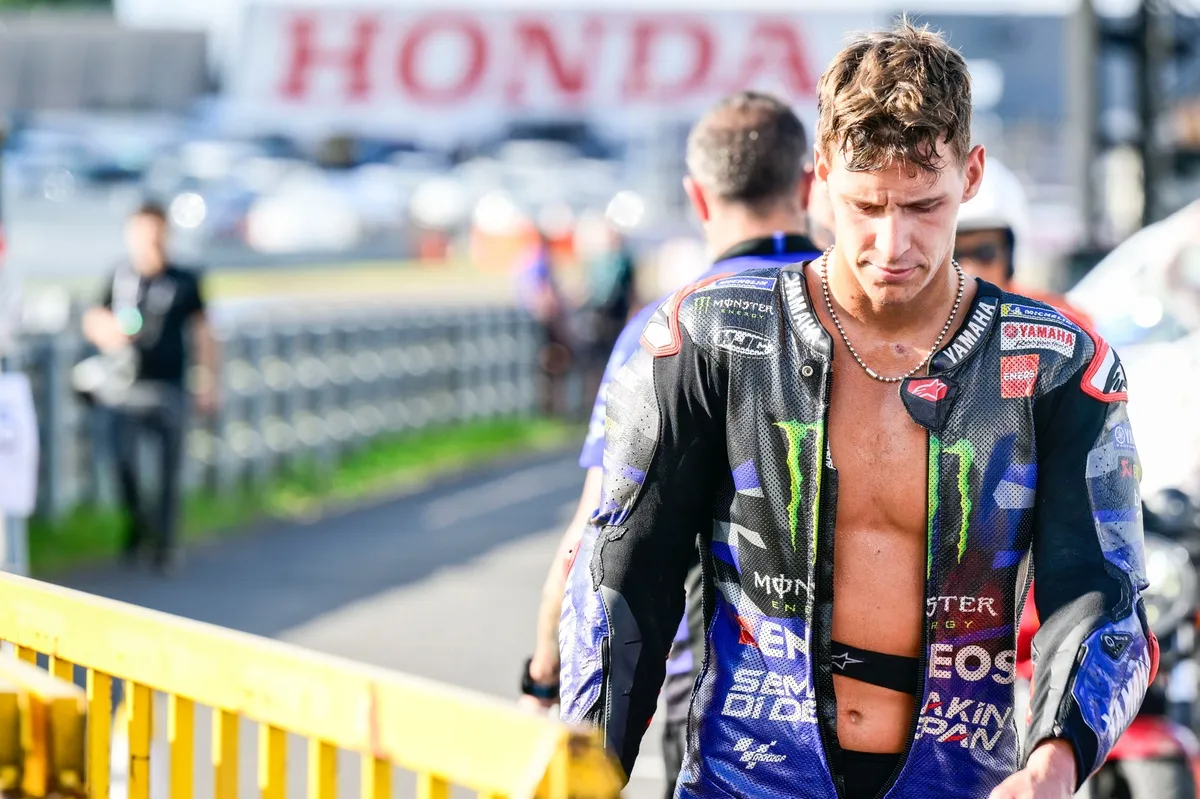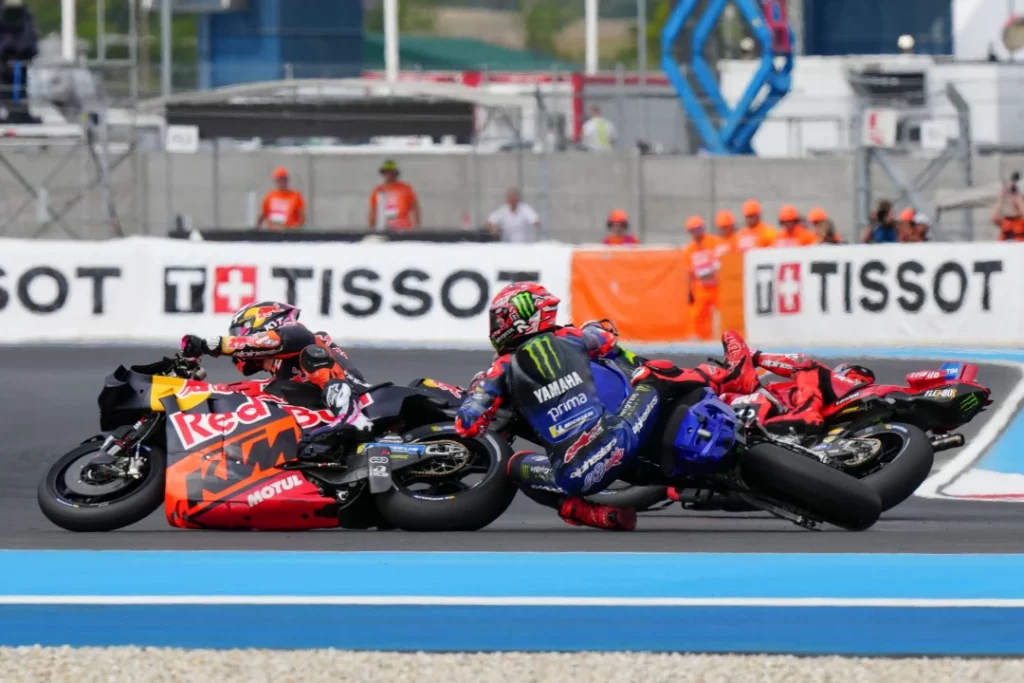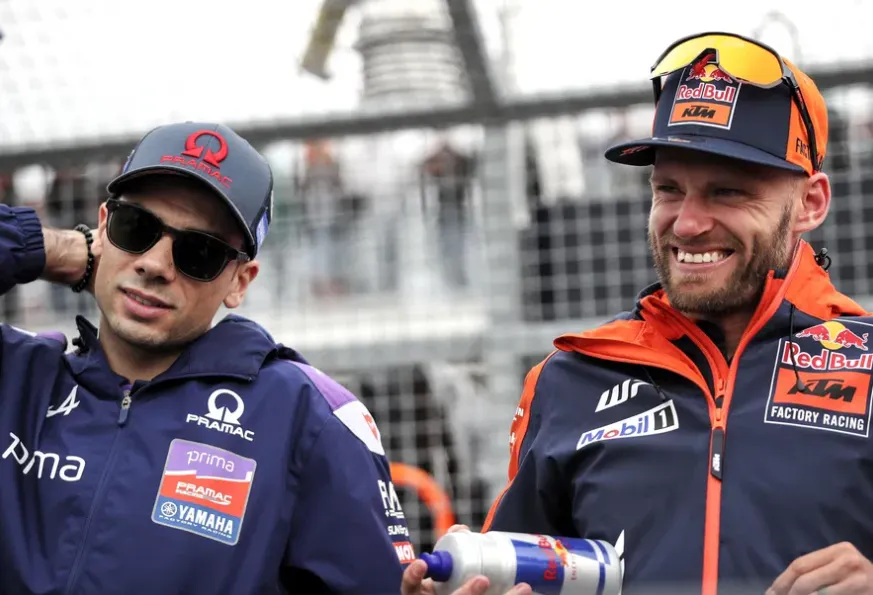

Fabio Quartararo’s Braking Blamed as Poncharal Slams ‘ChatGPT Ruling’ on Bastianini
MotoGP is rarely short of drama, but the aftermath of the Hungarian sprint delivered one of the most heated controversies of the season. Tech3 team principal Hervé Poncharal launched a blistering attack on race stewards after Enea Bastianini was slapped with a double long-lap penalty for his part in a multi-rider crash. According to Poncharal, the blame lay not with Bastianini but with Fabio Quartararo’s aggressive braking and an equipment failure that turned a tough battle into a disaster.
Poncharal’s anger wasn’t just directed at the penalty—it was at the process. In his eyes, the stewards’ decision lacked the nuance of human understanding and instead resembled what he mockingly called a “ChatGPT ruling”: cold, automatic, and devoid of racing context.
The Crash That Sparked the Controversy
The incident unfolded early in the sprint at the Hungaroring, with a tight midfield battle brewing. Quartararo, fighting hard to make up ground, braked aggressively going into the corner. In the heat of the fight, his ride-height device malfunctioned, upsetting the balance of the Yamaha and causing an erratic deceleration.
Bastianini, following closely behind, had little room to react. Despite his efforts to avoid contact, he was tangled up in the chaos and went down, taking other riders with him. While the initial television replays suggested Bastianini was at fault for running into the back of Quartararo, further analysis revealed a far more complicated picture.

Stewards’ Verdict: Bastianini to Blame
The MotoGP stewards handed Bastianini a double long-lap penalty for “irresponsible riding,” a decision that shocked many in the paddock. Bastianini, already nursing a frustrating season, suddenly found himself branded as reckless, while Quartararo escaped without sanction.
For Poncharal, the decision was both unfair and damaging to the sport’s credibility. “It’s like a robotic decision with no emotion, no understanding of what really happened,” he raged. “Bastianini was the main victim of that crash, not the aggressor. To penalize him like this makes no sense.”
Poncharal’s Fury: “A ChatGPT Ruling”
Poncharal’s most stinging criticism came in his comparison to artificial intelligence. By calling it a “ChatGPT ruling,” he suggested the stewards were behaving like machines—processing the surface-level facts but failing to apply the deeper judgment required in racing.
“The stewards looked at the replay, saw one rider hit another, and just pressed the penalty button,” Poncharal said. “That is not how you manage MotoGP. You need people with racing knowledge, people who can see the cause and effect, not just the consequence.”
His frustration also reflected a wider paddock sentiment: that MotoGP’s stewarding has become inconsistent, sometimes harsh and sometimes lenient, with little transparency in how decisions are made.
Quartararo’s Role Under Scrutiny
For once, Fabio Quartararo found himself in the spotlight not as a victim of Yamaha’s lack of competitiveness, but as a central figure in the crash. Critics argued that his aggressive braking was unnecessary so early in the race, especially given the traffic around him. The broken ride-height device only amplified the chaos, turning a normal battle into a chain reaction that ensnared multiple riders.
While Quartararo was not penalized, Poncharal pointed to him as the trigger of the incident. “Fabio had a technical problem and braked in a way that caught everyone out,” Poncharal said. “It’s not his fault the device broke, but to punish the guy behind him instead of looking at the full context is wrong.”
Rider Reactions
The crash and its aftermath quickly became the talking point in the paddock. Several riders sympathized with Bastianini, acknowledging how little room for maneuver he had. Others stressed the need for consistency in stewarding, noting that similar incidents in past races had resulted in no penalties or warnings.
Privately, some Yamaha insiders admitted that the ride-height device failure was a contributing factor, though they were relieved Quartararo avoided penalty points. For Bastianini, however, the damage was twofold: a ruined sprint and a reputation dented by what many see as a questionable call.
A Bigger Debate on MotoGP Stewarding
Poncharal’s “ChatGPT ruling” remark has already become a viral talking point, not only because of its humor but because it highlights a growing concern about MotoGP stewarding. Many teams and riders feel decisions are made with an overly simplistic view of incidents, rather than considering the complexities of racing dynamics.
There are now renewed calls for more transparency—whether through clearer explanations, rider panels, or even the release of full stewarding discussions after controversial decisions. Fans, too, are demanding better consistency, as the sport risks alienating viewers with decisions that seem arbitrary.

What It Means Going Forward
For Bastianini, the penalty is another bitter pill in a season where he has struggled to recapture his peak form. For Quartararo, the incident is an uncomfortable reminder that even amid Yamaha’s technical woes, his own racecraft will always be under scrutiny. And for Poncharal, it’s a crusade: a demand that stewarding evolve with the sport, not reduce complex incidents to black-and-white judgments.
The “ChatGPT ruling” quip might have been tongue-in-cheek, but it encapsulates a serious issue: the need for MotoGP to balance the letter of the law with the spirit of racing. As long as riders feel the human element is being stripped away from decision-making, tensions like this will continue to boil over.
Conclusion
Hervé Poncharal’s furious reaction to Enea Bastianini’s double penalty in Hungary has reopened MotoGP’s ongoing debate about stewarding, fairness, and accountability. By likening the stewards’ judgment to a “ChatGPT ruling,” the Tech3 boss delivered both a stinging insult and a rallying cry: that MotoGP deserves human judgment rooted in racing knowledge, not mechanical box-ticking.
Whether this controversy leads to reform or fades into another chapter of MotoGP politics remains to be seen. But one thing is clear: when the dust settles on the Hungarian sprint, the conversation will not just be about lap times or podiums—it will be about justice, consistency, and the credibility of MotoGP’s rule-makers.


















